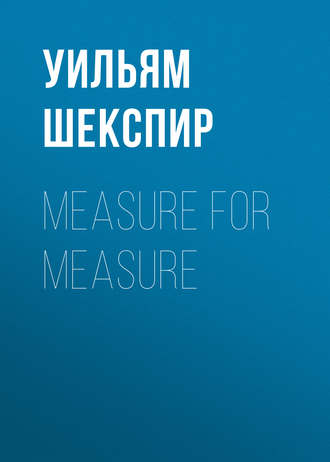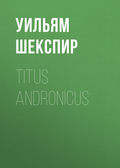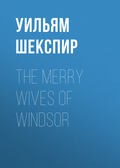
Уильям Шекспир
Measure for Measure
Scene II. The street before the prison
Enter, on one side, DUKE disguised as before; on the other, ELBOW, and OFFICERS with POMPEY
ELBOW. Nay, if there be no remedy for it, but that you will
needs
buy and sell men and women like beasts, we shall have all the
world drink brown and white bastard.
DUKE. O heavens! what stuff is here?
POMPEY. 'Twas never merry world since, of two usuries, the
merriest
was put down, and the worser allow'd by order of law a furr'd
gown to keep him warm; and furr'd with fox on lamb-skins too,
to
signify that craft, being richer than innocency, stands for
the
facing.
ELBOW. Come your way, sir. Bless you, good father friar.
DUKE. And you, good brother father. What offence hath this man
made
you, sir?
ELBOW. Marry, sir, he hath offended the law; and, sir, we take
him
to be a thief too, sir, for we have found upon him, sir, a
strange picklock, which we have sent to the deputy.
DUKE. Fie, sirrah, a bawd, a wicked bawd!
The evil that thou causest to be done,
That is thy means to live. Do thou but think
What 'tis to cram a maw or clothe a back
From such a filthy vice; say to thyself
'From their abominable and beastly touches
I drink, I eat, array myself, and live.'
Canst thou believe thy living is a life,
So stinkingly depending? Go mend, go mend.
POMPEY. Indeed, it does stink in some sort, sir; but yet, sir,
I would prove-
DUKE. Nay, if the devil have given thee proofs for sin,
Thou wilt prove his. Take him to prison, officer;
Correction and instruction must both work
Ere this rude beast will profit.
ELBOW. He must before the deputy, sir; he has given him
warning.
The deputy cannot abide a whoremaster; if he be a
whoremonger,
and comes before him, he were as good go a mile on his
errand.
DUKE. That we were all, as some would seem to be,
From our faults, as his faults from seeming, free.
ELBOW. His neck will come to your waist- a cord, sir.
Enter LUCIO
POMPEY. I spy comfort; I cry bail. Here's a gentleman, and a
friend
of mine.
LUCIO. How now, noble Pompey! What, at the wheels of Caesar?
Art
thou led in triumph? What, is there none of Pygmalion's
images,
newly made woman, to be had now for putting the hand in the
pocket and extracting it clutch'd? What reply, ha? What
say'st
thou to this tune, matter, and method? Is't not drown'd i'
th'
last rain, ha? What say'st thou, trot? Is the world as it
was,
man? Which is the way? Is it sad, and few words? or how? The
trick of it?
DUKE. Still thus, and thus; still worse!
LUCIO. How doth my dear morsel, thy mistress? Procures she
still,
ha?
POMPEY. Troth, sir, she hath eaten up all her beef, and she is
herself in the tub.
LUCIO. Why, 'tis good; it is the right of it; it must be so;
ever
your fresh whore and your powder'd bawd- an unshunn'd
consequence; it must be so. Art going to prison, Pompey?
POMPEY. Yes, faith, sir.
LUCIO. Why, 'tis not amiss, Pompey. Farewell; go, say I sent
thee
thither. For debt, Pompey- or how?
ELBOW. For being a bawd, for being a bawd.
LUCIO. Well, then, imprison him. If imprisonment be the due of
a
bawd, why, 'tis his right. Bawd is he doubtless, and of
antiquity, too; bawd-born. Farewell, good Pompey. Commend me
to
the prison, Pompey. You will turn good husband now, Pompey;
you
will keep the house.
POMPEY. I hope, sir, your good worship will be my bail.
LUCIO. No, indeed, will I not, Pompey; it is not the wear. I
will
pray, Pompey, to increase your bondage. If you take it not
patiently, why, your mettle is the more. Adieu trusty Pompey.
Bless you, friar.
DUKE. And you.
LUCIO. Does Bridget paint still, Pompey, ha?
ELBOW. Come your ways, sir; come.
POMPEY. You will not bail me then, sir?
LUCIO. Then, Pompey, nor now. What news abroad, friar? what
news?
ELBOW. Come your ways, sir; come.
LUCIO. Go to kennel, Pompey, go.
Exeunt ELBOW, POMPEY and OFFICERS
What news, friar, of the Duke?
DUKE. I know none. Can you tell me of any?
LUCIO. Some say he is with the Emperor of Russia; other some,
he is
in Rome; but where is he, think you?
DUKE. I know not where; but wheresoever, I wish him well.
LUCIO. It was a mad fantastical trick of him to steal from the
state and usurp the beggary he was never born to. Lord Angelo
dukes it well in his absence; he puts transgression to't.
DUKE. He does well in't.
LUCIO. A little more lenity to lechery would do no harm in him;
something too crabbed that way, friar.
DUKE. It is too general a vice, and severity must cure it.
LUCIO. Yes, in good sooth, the vice is of a great kindred; it
is
well allied; but it is impossible to extirp it quite, friar,
till
eating and drinking be put down. They say this Angelo was not
made by man and woman after this downright way of creation. Is it true, think you? DUKE. How should he be made, then? LUCIO. Some report a sea-maid spawn'd him; some, that he was begot between two stock-fishes. But it is certain that when he makes water his urine is congeal'd ice; that I know to be true. And he is a motion generative; that's infallible. DUKE. You are pleasant, sir, and speak apace. LUCIO. Why, what a ruthless thing is this in him, for the rebellion of a codpiece to take away the life of a man! Would the Duke that is absent have done this? Ere he would have hang'd a man for the getting a hundred bastards, he would have paid for the nursing a thousand. He had some feeling of the sport; he knew the service, and that instructed him to mercy. DUKE. I never heard the absent Duke much detected for women; he was not inclin'd that way. LUCIO. O, sir, you are deceiv'd. DUKE. 'Tis not possible. LUCIO. Who- not the Duke? Yes, your beggar of fifty; and his use was to put a ducat in her clack-dish. The Duke had crotchets in him. He would be drunk too; that let me inform you. DUKE. You do him wrong, surely. LUCIO. Sir, I was an inward of his. A shy fellow was the Duke; and I believe I know the cause of his withdrawing. DUKE. What, I prithee, might be the cause? LUCIO. No, pardon; 'tis a secret must be lock'd within the teeth and the lips; but this I can let you understand: the greater file of the subject held the Duke to be wise. DUKE. Wise? Why, no question but he was. LUCIO. A very superficial, ignorant, unweighing fellow. DUKE. Either this is envy in you, folly, or mistaking; the very stream of his life, and the business he hath helmed, must, upon a warranted need, give him a better proclamation. Let him be but testimonied in his own bringings-forth, and he shall appear to the envious a scholar, a statesman, and a soldier. Therefore you speak unskilfully; or, if your knowledge be more, it is much dark'ned in your malice. LUCIO. Sir, I know him, and I love him. DUKE. Love talks with better knowledge, and knowledge with dearer love. LUCIO. Come, sir, I know what I know. DUKE. I can hardly believe that, since you know not what you speak. But, if ever the Duke return, as our prayers are he may, let me desire you to make your answer before him. If it be honest you have spoke, you have courage to maintain it; I am bound to call upon you; and I pray you your name? LUCIO. Sir, my name is Lucio, well known to the Duke. DUKE. He shall know you better, sir, if I may live to report you. LUCIO. I fear you not. DUKE. O, you hope the Duke will return no more; or you imagine me too unhurtful an opposite. But, indeed, I can do you little harm: you'll forswear this again. LUCIO. I'll be hang'd first. Thou art deceiv'd in me, friar. But no more of this. Canst thou tell if Claudio die to-morrow or no? DUKE. Why should he die, sir? LUCIO. Why? For filling a bottle with a tun-dish. I would the Duke we talk of were return'd again. This ungenitur'd agent will unpeople the province with continency; sparrows must not build in his house-eaves because they are lecherous. The Duke yet would have dark deeds darkly answered; he would never bring them to
light. Would he were return'd! Marry, this Claudio is
condemned
for untrussing. Farewell, good friar; I prithee pray for me.
The
Duke, I say to thee again, would eat mutton on Fridays. He's
not
past it yet; and, I say to thee, he would mouth with a beggar
though she smelt brown bread and garlic. Say that I said so.
Farewell. Exit
DUKE. No might nor greatness in mortality
Can censure scape; back-wounding calumny
The whitest virtue strikes. What king so strong
Can tie the gall up in the slanderous tongue?
But who comes here?
Enter ESCALUS, PROVOST, and OFFICERS with MISTRESS OVERDONE
ESCALUS. Go, away with her to prison.
MRS. OVERDONE. Good my lord, be good to me; your honour is
accounted a merciful man; good my lord.
ESCALUS. Double and treble admonition, and still forfeit in the
same kind! This would make mercy swear and play the tyrant.
PROVOST. A bawd of eleven years' continuance, may it please
your
honour.
MRS. OVERDONE. My lord, this is one Lucio's information against
me.
Mistress Kate Keepdown was with child by him in the Duke's
time;
he promis'd her marriage. His child is a year and a quarter
old
come Philip and Jacob; I have kept it myself; and see how he
goes
about to abuse me.
ESCALUS. That fellow is a fellow of much license. Let him be
call'd
before us. Away with her to prison. Go to; no more words.
[Exeunt
OFFICERS with MISTRESS OVERDONE] Provost, my brother Angelo
will
not be alter'd: Claudio must die to-morrow. Let him be
furnish'd
with divines, and have all charitable preparation. If my
brother
wrought by my pity, it should not be so with him.
PROVOST. So please you, this friar hath been with him, and
advis'd
him for th' entertainment of death.
ESCALUS. Good even, good father.
DUKE. Bliss and goodness on you!
ESCALUS. Of whence are you?
DUKE. Not of this country, though my chance is now
To use it for my time. I am a brother
Of gracious order, late come from the See
In special business from his Holiness.
ESCALUS. What news abroad i' th' world?
DUKE. None, but that there is so great a fever on goodness that
the
dissolution of it must cure it. Novelty is only in request;
and,
as it is, as dangerous to be aged in any kind of course as it
is
virtuous to be constant in any undertakeing. There is scarce
truth enough alive to make societies secure; but security
enough
to make fellowships accurst. Much upon this riddle runs the
wisdom of the world. This news is old enough, yet it is every
day's news. I pray you, sir, of what disposition was the
Duke?
ESCALUS. One that, above all other strifes, contended
especially to
know himself.
DUKE. What pleasure was he given to?
ESCALUS. Rather rejoicing to see another merry than merry at
anything which profess'd to make him rejoice; a gentleman of
all
temperance. But leave we him to his events, with a prayer
they
may prove prosperous; and let me desire to know how you find
Claudio prepar'd. I am made to understand that you have lent
him
visitation.
DUKE. He professes to have received no sinister measure from
his
judge, but most willingly humbles himself to the
determination of
justice. Yet had he framed to himself, by the instruction of
his
frailty, many deceiving promises of life; which I, by my good
leisure, have discredited to him, and now he is resolv'd to
die.
ESCALUS. You have paid the heavens your function, and the
prisoner
the very debt of your calling. I have labour'd for the poor
gentleman to the extremest shore of my modesty; but my
brother
justice have I found so severe that he hath forc'd me to tell
him
he is indeed Justice.
DUKE. If his own life answer the straitness of his proceeding,
it
shall become him well; wherein if he chance to fail, he hath
sentenc'd himself.
ESCALUS. I am going to visit the prisoner. Fare you well.
DUKE. Peace be with you! Exeunt ESCALUS and PROVOST
He who the sword of heaven will bear
Should be as holy as severe;
Pattern in himself to know,
Grace to stand, and virtue go;
More nor less to others paying
Than by self-offences weighing.
Shame to him whose cruel striking
Kills for faults of his own liking!
Twice treble shame on Angelo,
To weed my vice and let his grow!
O, what may man within him hide,
Though angel on the outward side!
How may likeness, made in crimes,
Make a practice on the times,
To draw with idle spiders' strings
Most ponderous and substantial things!
Craft against vice I must apply.
With Angelo to-night shall lie
His old betrothed but despised;
So disguise shall, by th' disguised,
Pay with falsehood false exacting,
And perform an old contracting. Exit
Act IV. Scene I. The moated grange at Saint Duke's
Enter MARIANA; and BOY singing
SONG
Take, O, take those lips away,
That so sweetly were forsworn;
And those eyes, the break of day,
Lights that do mislead the morn;
But my kisses bring again, bring again;
Seals of love, but seal'd in vain, seal'd in vain.
Enter DUKE, disguised as before
MARIANA. Break off thy song, and haste thee quick away;
Here comes a man of comfort, whose advice
Hath often still'd my brawling discontent. Exit BOY
I cry you mercy, sir, and well could wish
You had not found me here so musical.
Let me excuse me, and believe me so,
My mirth it much displeas'd, but pleas'd my woe.
DUKE. 'Tis good; though music oft hath such a charm
To make bad good and good provoke to harm.
I pray you tell me hath anybody inquir'd for me here to-day.
Much
upon this time have I promis'd here to meet.
MARIANA. You have not been inquir'd after; I have sat here all
day.
Enter ISABELLA
DUKE. I do constantly believe you. The time is come even now. I
shall crave your forbearance a little. May be I will call
upon
you anon, for some advantage to yourself.
MARIANA. I am always bound to you. Exit
DUKE. Very well met, and well come.
What is the news from this good deputy?
ISABELLA. He hath a garden circummur'd with brick,
Whose western side is with a vineyard back'd;
And to that vineyard is a planched gate
That makes his opening with this bigger key;
This other doth command a little door
Which from the vineyard to the garden leads.
There have I made my promise
Upon the heavy middle of the night
To call upon him.
DUKE. But shall you on your knowledge find this way?
ISABELLA. I have ta'en a due and wary note upon't;
With whispering and most guilty diligence,
In action all of precept, he did show me
The way twice o'er.
DUKE. Are there no other tokens
Between you 'greed concerning her observance?
ISABELLA. No, none, but only a repair i' th' dark;
And that I have possess'd him my most stay
Can be but brief; for I have made him know
I have a servant comes with me along,
That stays upon me; whose persuasion is
I come about my brother.
DUKE. 'Tis well borne up.
I have not yet made known to Mariana
A word of this. What ho, within! come forth.
Re-enter MARIANA
I pray you be acquainted with this maid;
She comes to do you good.
ISABELLA. I do desire the like.
DUKE. Do you persuade yourself that I respect you?
MARIANA. Good friar, I know you do, and have found it.
DUKE. Take, then, this your companion by the hand,
Who hath a story ready for your ear.
I shall attend your leisure; but make haste;
The vaporous night approaches.
MARIANA. Will't please you walk aside?
Exeunt MARIANA and ISABELLA
DUKE. O place and greatness! Millions of false eyes
Are stuck upon thee. Volumes of report
Run with these false, and most contrarious quest
Upon thy doings. Thousand escapes of wit
Make thee the father of their idle dream,
And rack thee in their fancies.
Re-enter MARIANA and ISABELLA
Welcome, how agreed?
ISABELLA. She'll take the enterprise upon her, father,
If you advise it.
DUKE. It is not my consent,
But my entreaty too.
ISABELLA. Little have you to say,
When you depart from him, but, soft and low,
'Remember now my brother.'
MARIANA. Fear me not.
DUKE. Nor, gentle daughter, fear you not at all.
He is your husband on a pre-contract.
To bring you thus together 'tis no sin,
Sith that the justice of your title to him
Doth flourish the deceit. Come, let us go;
Our corn's to reap, for yet our tithe's to sow. Exeunt






